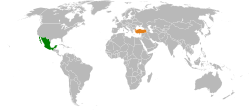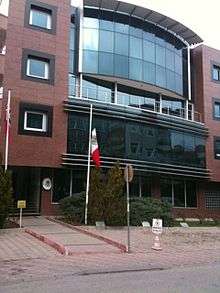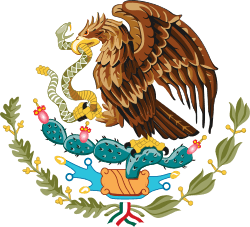Mexico–Turkey relations
 | |
Mexico |
Turkey |
|---|---|
Mexico–Turkey relations refers to the bilateral relations between Mexico and Turkey. Both nations are members of the Australia Group, G20, Organisation for Economic Co-operation and Development and the United Nations.
History

The first official contact between Mexico and the Ottoman Empire (present day Turkey) was 1864 when Emperor Maximilian I of Mexico sent out emissaries to several nations to seek official recognition of his rule in the country.[1] Diplomatic relations between the two nations were established in 1928 after the transformation of Turkey from the Ottoman Empire by Mustafa Kemal Atatürk, founder of the modern Turkish republic in 1923; and after the end of the Mexican revolution in 1920. That same year, both nations signed a 'Friendship Agreement'.[2] Almost immediately, both nations opened diplomatic legations in each other's capitals, respectively. In 1962, their respective diplomatic missions were upgraded to embassies.[2]
In June 1992, Mexican Foreign Secretary Fernando Solana paid an official visit to Turkey, becoming at the time the highest level government official to visit the country. While in Turkey, Secretary Solana and his counterpart, Foreign Minister Suleyman Demirel signed agreements on cultural exchanges and of eliminating visa requirements for diplomatic passport holders of both nations. The two nations also agreed to establish a mechanism for political consultations to discuss points of views on bilateral and multilateral mutual interests.[2] In 1998, Prime Minister Mesut Yılmaz became the first Turkish head-of-state to pay an official visit to Mexico.[3] In 2009, then Prime Minister Recep Tayyip Erdogan paid a visit to Mexico. In 2013, President Enrique Peña Nieto became the first Mexican head-of-state pay a visit to Turkey.[4]
Both nations are considered as regional powers and are playing bigger roles in the international community. Both nations have supported each other diplomatically, particularly in the United Nations and Mexico has supported Turkey over the issue of the Syrian Civil War occurring on its border. In 2013, Mexico donated $1 million USD to Turkey for the support of over one million Syrian refugees that are currently being housed in the country.[5] In July 2018, both nations celebrated 90 years of diplomatic relations.[6]
State visits
Presidential visits from Mexico to Turkey[4][7]
- President Enrique Peña Nieto (2013, 2015)
Presidential and Prime Ministerial visits from Turkey to Mexico[3][8]
- Prime Minister Mesut Yılmaz (1998)
- Prime Minister and President Recep Tayyip Erdogan (2009, 2012, 2014)
Bilateral agreements
Both nations have signed several bilateral agreements, such as a Friendship Agreement (1928); Agreements on Cultural Exchanges (1992); Agreement on Eliminating Visa requirements for Diplomatic Passport holders (1992); Memorandum of Understanding for the Establishment of a Mechanism of Consultation in Matters of Mutual Interest (2013); Agreement on the avoidance of Double-Taxation and Tax Evasion (2013); Customs Agreement (2013); Agreement on Air Transportation (2013); Agreement on the Protection of Investments (2013); Agreement of Cooperation in Combating against Illicit Trafficking in Narcotic Drugs and Psychotropic Substances (2013); Agreement of Cooperation in Combating Organized Crime and Terrorism (2013) and an Agreement in Science and Technical Cooperation (2013).[9]
Trade

In 2017, trade between both nations amounted to $1 billion USD.[10][11] Mexico's main exports to Turkey include: wheat, telephones and vehicles. Turkey's exports to Mexico include: textiles, copper and aluminum-based products.[12] Turkey is Mexico's 47th largest trading partner.[11] Mexican multinational companies such as Cemex, Gruma and Zinc Nacional operate in Turkey and have invested over $600 million USD in the country.[13] Turkish multinational companies such as Orphan Holding, Tekno Kauch and Toto Max operate in Mexico.[13] Both nations are currently negotiating on a free trade agreement.[14]
Resident diplomatic missions
- Mexico has an embassy in Ankara and a consulate in Istanbul.[15]
- Turkey has an embassy in Mexico City.[16]
See also
References
- ↑ La política exterior de Maximiliano de Habsburgo durante el Segundo Imperio Mexicano (in Spanish)
- 1 2 3 History of diplomatic relations between Mexico and Turkey (in Spanish)
- 1 2 Prime Minister Mesut Yılmaz on a visit to Mexico (in Spanish)
- 1 2 Peña Nieto visita Turquía para lanzar nueva etapa de relaciones (in Spanish)
- ↑ México donará un million de dollars a Turquía para apoyar a sirios. (in Spanish)
- ↑ México y Turquía celebran 90 años de relaciones diplomáticas (in Spanish)
- ↑ Peña Nieto arriba a Turquía para Cumbre del G-20 (in Spanish)
- ↑ Presidente Erdogan de Turquía inicia visita de Estado en México (in Spanish)
- ↑ Acuerdos firmados entre México y Turquía (in Spanish)
- ↑ Mexican Ministry of the Economy: Turkey (in Spanish)
- 1 2 Relación Bilateral México-Turquia (Spanish)
- ↑ Busca México tratado de libre comercio con Turquía (in Spanish)
- 1 2 Inversiones turcas en autopartes se avecinan con TLC (in Spanish)
- ↑ Turquía está interesado en un TLC con México (in Spanish)
- ↑ Embassy of Mexico in Ankara (in Spanish and Turkish)
- ↑ Embassy of Turkey in Mexico City (in Spanish and Turkish)

